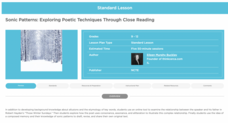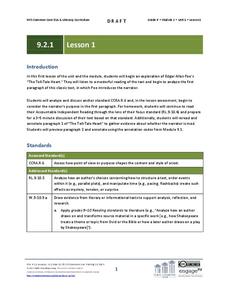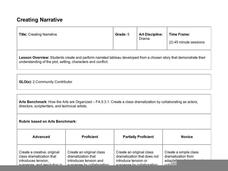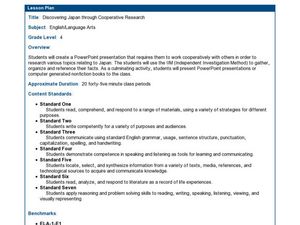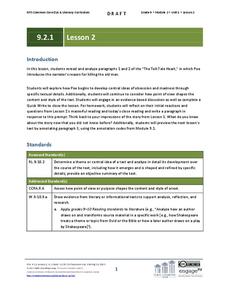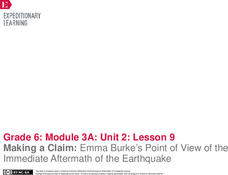National Endowment for the Humanities
“Every Day We Get More Illegal” by Juan Felipe Herrera
A study of Jan Felipe Herrera's poem "Every Day We Get More Illegal" opens the door for a discussion on immigration. To begin, class members examine the photograph "Desert Survival," record their observations of the image, and then...
K12 Reader
"How Do I Love Thee?" Supporting Ideas
Show your class what poem the famous line "How do I love thee? Let me count the ways" comes from. Class members read Elizabeth Barrett Browning's poem and respond to one question with a short paragraph. The question asks learners to use...
Curated OER
Kumeyaay Indians
Useful for literary analysis, citing textual evidence, or summary skills, this lesson about the Kumeyaay Indians would be a good addition to your language arts class. Middle schoolers read novels and summarize the literature in their own...
Curated OER
The Effects of Slavery
The emotional and spiritual oppression of slavery in the African-American experience is the focus of this instructional activity. Middle schoolers analyze various texts by Frederick Douglass and Maya Angelou related to freedom and...
ReadWriteThink
Sonic Patterns: Exploring Poetic Techniques Through Close Reading
Robert Hayden's poem "Those Winter Sundays" serves as the anchor text in a five-part lesson plan that takes the mystery out of poetry analysis by modeling explicit strategies for pupils to employ to conduct a close reading of a poem....
Curated OER
Preparing for Poetry: A Reader's First Steps
Students complete poetry analysis using William Shakespeare's "Sonnet 130" as a part of a study of figurative language. In this Shakespearean language lesson, students define literal and figurative language and practice paraphrasing and...
Curated OER
Japanese Poetry: Tanka? You're Welcome!
Students analyze Japanese tanka poetry. In this Japanese poetry lesson, students identify analyze the structure of tanka poetry. Students complete the activities at the given links for the lesson and compose two tanka poems.
E Reading Worksheets
Tone Worksheet 5
A speaker's attitude toward his or her subject matter determines the tone of a piece of literature. Interpret the tone of four different poems, as well as their meanings, with supporting textual details.
E Reading Worksheets
Tone Worksheet 3
The interpretation of a poem often lies in the mind of its reader, especially when reading the tone. Focus on author's word choice, middle schoolers read four different poems and briefly state a perceived tone for each, along with the...
E Reading Worksheets
Tone Worksheet 2
The beauty of a poem is lost without an understanding of its tone. Middle schoolers connect author's purpose and word choice to four poems in a literary analysis activity, which prompts them to note each poem's tone and meaning.
National Endowment for the Humanities
“The Great Migration” by Minnie Bruce Pratt
Minnie Bruce Pratt's poem, "The Great Migration," offers young scholars an opportunity to reflect on how where we come from influences who we are. Groups conduct a close reading of the poem, recording observations about the poem's...
EngageNY
Grade 9 ELA Module 2: Unit 1, Lesson 1
Once conceived, a guided set of literary analysis lessons will assist you day and night. Ninth graders look closely at "The Tell-Tale Heart" and analyze how Poe uses point of view to create questions about the narrator's sanity and...
K20 LEARN
It’s Never Too Late to Apologize: Character Development and Theme in “The Scarlet Ibis”
Sometimes saying I'm sorry just doesn't cut it. Scholars examine a series of apology poems, songs, and stories and consider each speaker's regrets. Using what they have learned, they analyze James Hurst's short story, "The Scarlet Ibis,"...
Brethren High School
Romanticism Through the Eyes of Art, Poetry, and Technology
Use this simple collaborative activity to introduce the definition, art, and poetry of romanticism. Educators will have to provide the poetry, images of the art, and the survey for the learners, but by using this resource, they won't...
Hawaiʻi State Department of Education
Creating Narrative
Plot, setting, characters, and conflict are common to both drama and narrative stories. Kids create narrated tableaus that show their understanding of the plot, setting, and conflict of a story they've recently read. The lesson...
EngageNY
Inferring about Character: Close Reading of the Poem “Inside Out” and Introducing QuickWrites
Grab a partner! Scholars partner up to take a second look at the verse novel Inside Out & Back Again. They discuss questions about and connections to the novel and then learn how to complete a Quick Write task properly. To finish,...
Curated OER
Discovering Japan Through Cooperative Research
Search a variety of sources to create a multimedia or book project about Japan. Learners use the independent investigation method to plan and conduct research about Japan. They use the information they discover to create a computer book...
Curated OER
Analyzing Poetry and Characters
Students investigate historical context by reading poetry. In this language arts instructional activity, students discover the work of Michael Longley and examine his poem "Ceasefire." Students identify the sonnets used in the piece...
Curated OER
Heaven or Ground Hog Day?
Students discover the ideas of enlightenment by reading historical poetry. For this philosophical lesson, students read poems by Sir Walter Scott and Sergeant Joyce Kilmer while discussing the themes of the writing with classmates....
EngageNY
Grade 9 ELA Module 2: Unit 1, Lesson 2
Make up your mind to complete a lesson plan about "The Tell-Tale Heart" and forever rid yourself of simple sentence structures. As ninth graders analyze the first two paragraphs of Edgar Allan Poe's short story, they consider how text...
California Education Partners
The Road Not Taken
An effective lesson plan truly can make all the difference. Seventh graders read, analyze, and annotate Robert Frost's "The Road Not Taken" before writing an essay about what they believe to be the theme of the iconic poem.
EngageNY
Making a Claim: Emma Burke’s Point of View of the Immediate Aftermath of the Earthquake
Sharpen those pencils; it's time to write! Scholars begin writing the first body paragraph of their literary analysis essays. Additionally, pupils use graphic organizers to analyze a character's point of view from Laurence Yep's...
Novelinks
Tuck Everlasting: Bio-Poem
Learn about the characters of Natalie Babbitt's Tuck Everlasting with a character biopoem. Readers fill in a poem format to detail the character traits of Winnie, Jesse, Miles, and Mae, and share their finished poems with their peers.
EngageNY
Grade 9 ELA Module 2: Unit 1, Lesson 13
Whether the planks hide the beating of a hideous heart or they break away to the madness beneath, their presence makes itself known in the final instructional activity of a literary analysis unit. Having gathered textual evidence from...






